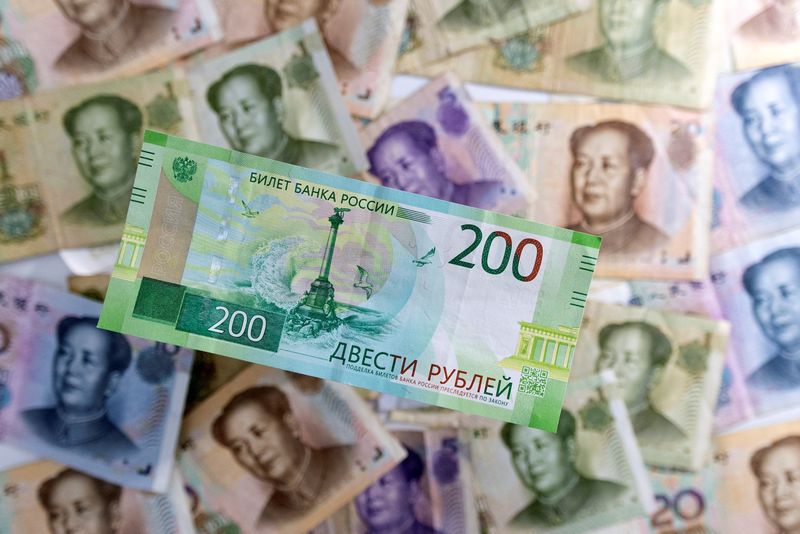Analysis: Scalded by Russia, investment funds tread carefully in China
2022.07.06 08:06

FILE PHOTO: Russian Rouble banknote is placed on Chinese Yuan banknotes in this illustration taken May 30, 2022. REUTERS/Dado Ruvic/Illustration
By Sujata Rao and Tommy Wilkes
LONDON (Reuters) – China, the only big economy promising a growth rebound this year, is again luring foreign investors. Yet the fear that Beijing may someday end up as ostracised from global markets as Russia is keeping a lid on demand.
The scale and coordination of Western sanctions on Russia triggered by President Vladimir Putin’s Feb. 24 invasion of Ukraine stunned financial markets and left managers sitting on billions of dollars of assets suddenly made worthless overnight.
While such a move against China seems far-fetched given its economic size and the vast amount of foreign money invested there, it’s a risk many are reluctant to ignore.
“The global investment community is on notice that if another geopolitical event were to occur, the precedent is already set for these very restrictive and punitive sanctions,” said Bill Campbell, a portfolio manager at DoubleLine Capital, which manages $122 billion in assets.
DoubleLine CEO Jeffrey Gundlach labelled China uninvestable because of out-of-the-blue regulatory crackdowns, forcible share delistings and a last-minute suspension in late 2020 of the multi-billion dollar initial public offering of billionaire Jack Ma’s Ant Group.
Campbell said a “new paradigm” was at play where geopolitical events threaten “immediate effects for investments and indexes”, pointing to tensions around Taiwan and in the South China Sea as potential flashpoints with the West.
China’s huge weighting in stock and bond indexes meant investors, including his firm, need some exposure. DoubleLine has been buying the bonds of regional development banks and using other Asian countries as proxies for China to avoid tying up too much money onshore.
Sino-U.S. tensions have simmered for years over issues ranging from international trade to intellectual property rights, but most recently Washington told Beijing it would face consequences if it supported Russia’s war effort in Ukraine which the Kremlin calls a “special military operation”.
The United States says China has largely complied with restrictions, but last week blacklisted five Chinese companies for allegedly supporting Russia’s military industrial base.
A bill tabled in the U.S. Senate also threatens sanctions on Beijing for aggression against Taiwan, an island China considers its own territory.
Flavio Carpenzano, investment director at Capital Group which manages $2.6 trillion worth of assets, trimmed exposure to Chinese government bonds after Russia’s invasion.
“It doesn’t mean we think China is uninvestable or that we expect a conflict with Taiwan tomorrow, but volatility will remain high and we don’t think the yield incorporates this kind of volatility,” Carpenzano said.
BlackRock (NYSE:BLK), the world’s biggest asset manager and a long-standing China bull, cut its Chinese equity view in May, warning risks of military confrontation with Taiwan will increase as the decade wears on.
PERCEIVED RISK
Investors pulled $30 billion-plus from China in the January-March period, according to the Institute of International Finance.
COVID lockdowns, property sector stress, and rising U.S. Treasury yields drove the outflows, yet the IIF also pointed to “the perceived risk of investing in countries whose relationships with the West are complicated”.
Still, the country’s economic recovery, contrasting with recession fears in the West, lured a net $11 billion of inflows into China-listed stocks last month, Refinitiv Eikon data shows.
“There is a shortage of things you can buy these days that may go up in price,” said Mike Kelly, head of multi-asset at PineBridge Investments, who holds Chinese property sector dollar bonds and is among those buying Chinese stocks again.
Kelly said no one buying into China could be completely comfortable but he was confident “that if they do something on Taiwan, it won’t be in the next two years”.
INDEX GIANT
Many argue the sheer size of China’s economy and markets make sanctions less likely, as they would harm the West far more than restrictions imposed on Russia. The fallout for global financial markets would be that much bigger too.
JPMorgan (NYSE:JPM) estimates foreigners own 5% of stocks and a smaller proportion of bonds in an overall $30 trillion market.
The volume of foreign cash invested in index-tracking products could prove a sticking point, given China comprises 40% of emerging equity indexes and 10% in JPMorgan’s GBI-EM emerging debt benchmark.
Russia, before the Ukraine invasion, had a 6.1% share of the debt benchmark.
The Russia-Ukraine conflict has sparked a flood of client questions regarding Chinese exposure, especially to equities, the head of emerging markets strategy at a major bank told Reuters.
The strategist, who declined to be named, said clients were weighing up how much money to allocate “to a market which you may not be able to exit in a hurry”.
One asset manager, WisdomTree, runs a fund excluding state-run Chinese firms and “is likely to launch (ex-China strategies) in the near-term from our own review of the market opportunity” said Jeremy Schwartz, chief investment officer at the firm, which manages $79 billion in assets.
Kelly of PineBridge said ultimately those investing in China needed to brace for sudden changes.
“The risk is there that you invest, have them pull a Putin on you and all of a sudden you are trapped,” he said.








